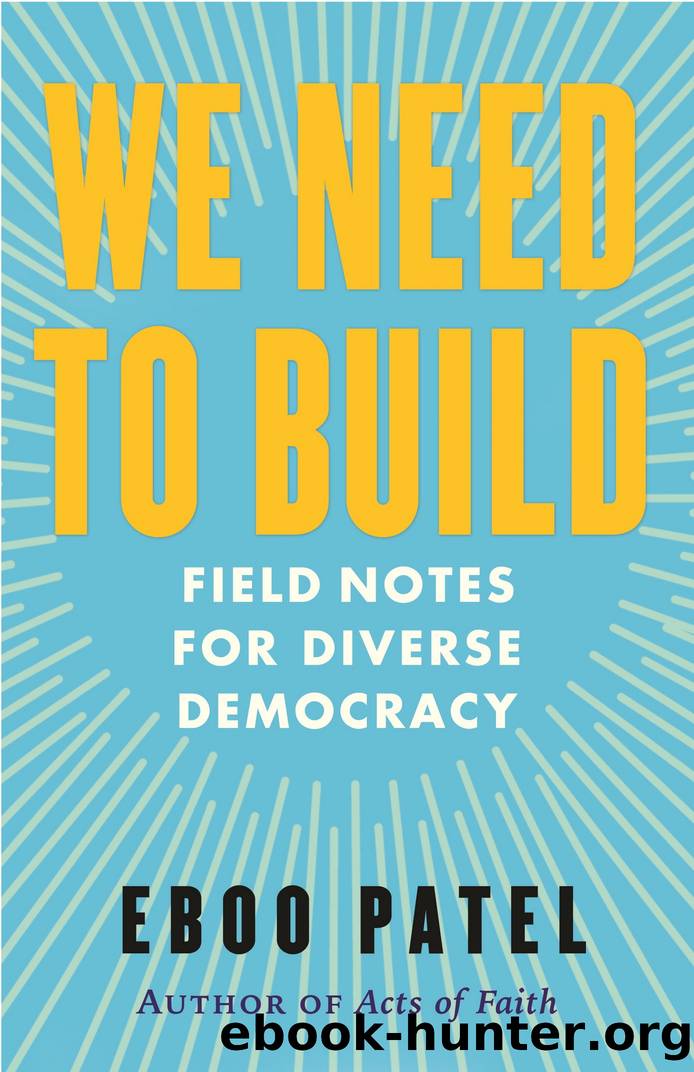We Need to Build by Eboo Patel

Author:Eboo Patel [Patel, Eboo]
Language: eng
Format: epub
Publisher: Beacon Press
Published: 2022-09-15T00:00:00+00:00
The Catholic Church is unique in scale, but not in kind. In their book The Upswing, Robert Putnam and Shaylyn Romney Garrett write, âReligious institutions have long been the single most important source of community connectedness and social solidarity in America. Even in our secular age, roughly half of all group memberships are religious in natureâcongregations, Bible study groups, prayer circles, and so forthâand roughly half of all philanthropy and volunteering is carried out in a religious context.â2
Here is how Putnam puts it in his earlier work, Bowling Alone: â[religious communities] provide an important incubator for civic skills, civic norms, community interests and civic recruitment. Religiously active men and women learn to give speeches, run meetings, manage disagreements and bear administrative responsibility.â3 As proof, he lists the programs on the calendar of a single day at Riverside Church on the Upper West Side of Manhattan. The activities included everything from meetings of the Ecology Task Force and the Narcotics Anonymous group to trainings for the staff of various social service programs to martial arts classes.
Importantly, that civic energy doesnât stay within the confines of the religious community; it gets offered to the broader society. People who join the Ecology Task Force at Riverside Church might find themselves being asked to lead a meeting, then being elected to chair the Task Force, and then deciding to start a similar Ecology Task Force in their workplace or neighborhood. Putnam and Romney Garrett report that people who are active in religious communities âare more than twice as likely to volunteer as demographically matched Americans who rarely attend church, and to volunteer not merely for church ushering, but also for secular causes.â Moreover, they make a claim to something that social scientists are generally enormously cautious about: âthe link between religious involvement and civic do-gooding is not spurious, but probably causal.â
Americans remain remarkably religious in comparison to citizens of other industrialized nations, but our involvement with religious communities has fallen dramatically. Congregations virtually across the board are losing participants. In their book American Grace, Robert Putnam and David Campbell note that involvement in religious communities has always had ups and downs in American history.4 It hit a high point in the 1950s, then a low point in the 1960s, then rose again in the 1970s and 1980s. As I write, religious involvement is at another low, and it is having a deep impact on the types of civic institutions that religious communities establish. The Southern Baptist denomination has trained eighty thousand people in disaster relief. They are on the ground within twenty-four hours of a tornado or a hurricane, doing everything from cleaning debris to helping people find shelter to preparing food. And itâs not just the Southern Baptists. Over half of the members of the National Voluntary Organizations Active in Disaster are faith-based groupsâCatholics, Methodists, Buddhists, Lutherans, Latter-day Saints, Muslims. It is interfaith America in action.
But as the numbers of people involved in those religious communities decline, so does the strength of faith-based agencies.
Download
This site does not store any files on its server. We only index and link to content provided by other sites. Please contact the content providers to delete copyright contents if any and email us, we'll remove relevant links or contents immediately.
Machine Learning at Scale with H2O by Gregory Keys | David Whiting(4289)
Never by Ken Follett(3929)
Fairy Tale by Stephen King(3365)
Reminders of Him: A Novel by Colleen Hoover(3068)
The Man Who Died Twice by Richard Osman(3060)
Will by Will Smith(2899)
Rationality by Steven Pinker(2346)
It Starts With Us (It Ends with Us #2) by Colleen Hoover(2324)
Can't Hurt Me: Master Your Mind and Defy the Odds - Clean Edition by David Goggins(2317)
Friends, Lovers, and the Big Terrible Thing by Matthew Perry(2211)
The Becoming by Nora Roberts(2183)
The Stranger in the Lifeboat by Mitch Albom(2109)
Love on the Brain by Ali Hazelwood(2053)
New Morning Mercies: A Daily Gospel Devotional by Paul David Tripp(1906)
The Strength In Our Scars by Bianca Sparacino(1834)
HBR's 10 Must Reads 2022 by Harvard Business Review(1832)
A Short History of War by Jeremy Black(1831)
A Game of Thrones (The Illustrated Edition) by George R. R. Martin(1705)
Never Finished: Unshackle Your Mind and Win the War Within by David Goggins(1694)
